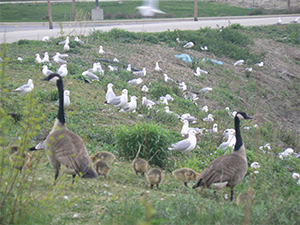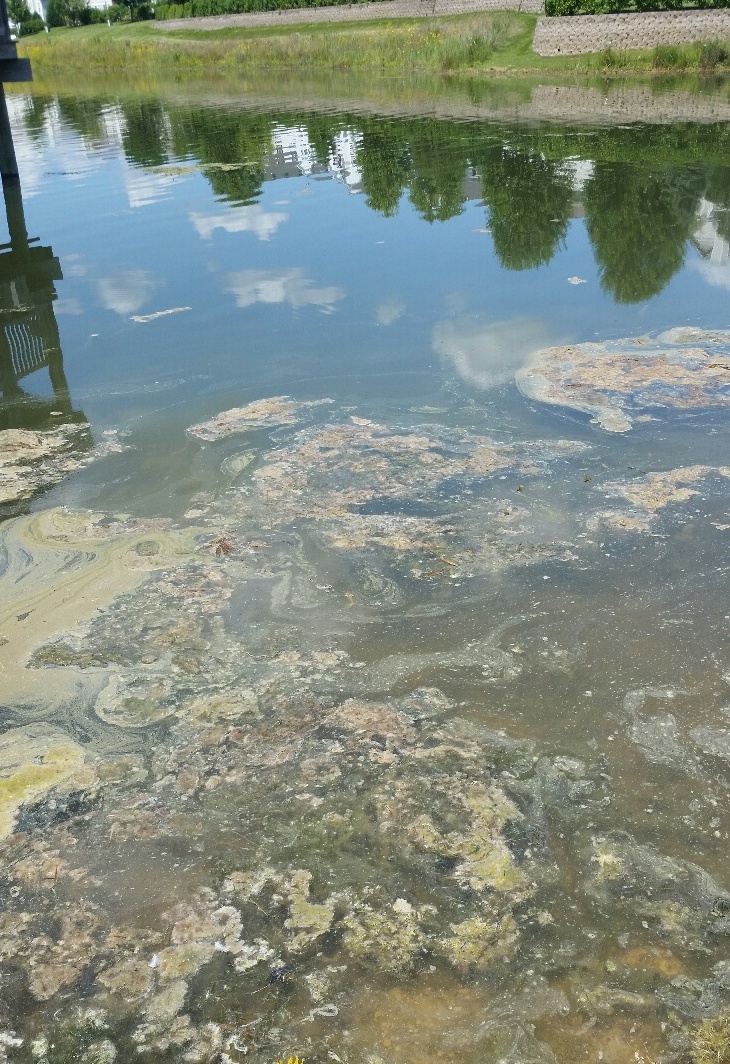Steps You Should Take for Reducing Summertime Bird-Caused Water Contamination
Jun 21, 2022
When summertime hits, people across Indiana “flock” to beaches and parks to enjoy the sun and cool off in the water.
Unfortunately, many beaches across the Midwest are closed due to contaminated water and park ponds everywhere are obscured by algae. Two key contributors to this not-so-great water quality are gulls and the Canada goose.
These birds produce copious amounts of waste, with geese in particular producing anywhere from 1-3 pounds a day, per bird. These feces are packed full of nitrogen, phosphorus, and other organic matter. If one goose stayed on a lake for a year, it could contribute up to a half pound of phosphorus to the water’s nutrient load. Multiplied by the 50 or more geese that make up a flock and you have the makings of an environmental hazard.
When accumulated, these nutrients contribute to toxic algal blooms and bacteria growth, which can make people and their pets very sick. Bacteria in the feces of geese and gulls include E.coli, salmonella, staphylococcus spp., and streptococcus spp. Plus, when the algae and poop begin to decompose later in the season, oxygen in the water gets depleted and fish can die, which is bad news for fishermen as well as swimmers.

Algae bloom
Contaminated Waterways: A Combination of Bird Waste & Rain
The larger the group of birds hanging out at a particular roosting site, the more likely they are to affect the quality of nearby water sources, whether it is a small pond at the local park or the beaches of Lake Michigan. The greatest impact occurs via runoff during heavy rain events. Feces left behind from birds loafing near water sources will affect water quality most significantly immediately after rain sweeps the waste into the bodies of water and causes mixing of the water column. Over time, with waste accumulating at the bottom of lakes and ponds and deposited on the shores where it will eventually be washed in, many local water holes can be affected.
How do we protect the water quality of our lakes and ponds? Preventing groups of birds from congregating near water is key.
Safe & Effective Strategies for Keeping Water Free of Bird Waste
One of the best ways to do this is by modifying the landscape. Letting shoreline grasses grow to 3 inches and higher will deter many geese and gulls, as these birds prefer shorter grasses for feeding and better visibility to detect approaching predators. If grasses can’t grow high enough, the addition of native plants can help as well. These can help prevent erosion, especially at beaches, and act as a natural barrier to feces entering water via runoff. The longer feces stay on the shore, the more bacteria will dry up and die off before it can reach the water.
Water quality can also be protected by reducing bird numbers in the area, and reducing attraction by enacting no feeding policies at parks and beaches. Egg depredation can help keep local resident populations from growing. Pond fencing will help keep out geese and encourage them to find a different water source. And finally, you can scare them away from an area using noise makers, lasers, and border collie dogs.
If you are experiencing water quality issues due to large numbers of gulls or Canada Geese, Wild Goose Chase Indy can help. With experts on staff and decades of experience managing nuisance bird species, we can help you solve your issues with humane, effective and cost-effective solutions.


 0
0
